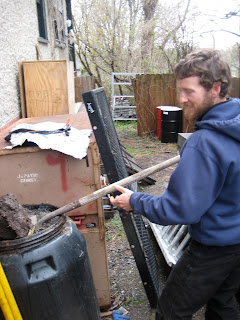Gordon,Thank you again for your time and concern. This helps alleviate the frustration and disheartened feelings in the wake of the city digging up and throwing away the plantings at the Hall Fletcher school while working on the storm drains. I figure we lost close to $400.00 of money we raised as community memebers for the original plant material and mulch. This doesn’t include three years of care and anticipation of fruiting that most likely would have begun this spring. Events like this, and the perennial girdling of young plantings by careless weed eaters by the school's, as well as parks and recs, grounds keepers are very familiar to us. This discourages people from volunteering. I try to tell them what they do will make a difference, but it is always one step forward and two steps back. We dont get paid for our efforts. The only reward we get is the possibility of making our community a little better for us and our kids.
Looking forward, I will talk to the people in my club (some who are in the Hall Fletcher community) and see what interest there is in revitalizing that planting. I have ideas, and the club has some resources, but I know many of them will be discouraged and angry. I will tell them of our meeting and hopefully they will see this as an opportunity and move on. If that goes well the second phase will be purchasing some native riparian meadow flower seed mix for the basin and discuss what we have in the budget to spare for plantings. Thank you for agreeing to leave the basin free from fescue and a 6 foot wide corridor around the top for plantings. I will keep you posted on the sentiments of the club. Please feel free to forward this to the people who supervise these projects as it is in their care that we trust. If they don’t know of the damage suffered, than we can never change the situation. Regards,Bill WhippleNeighbor and community supporter of the Hall Fletcher school
1.) I will talk to the Buncombe fruit nuts club and see what interest there is.
2.)Order native seed mix from Ernst seeds (paid by club)
3.)Redesign plantings and begin soil preparation
4.)(If possible) Gordon uses his influence to procure some well composted leaf mould and mulch from the city. A truck load of each dumped at the site would be optimal.
5.)Encourage a class, or classes to get involved (perhaps adopt a plant). Teachers can use this as an opportunity to incorporate into their curriculum essential skills needed in the future. Skills such as soil care and its restoration, riparian ecology, appropriate planting for ecosystems and microclimates, nutrition, wildlife, art for signs, etc …











